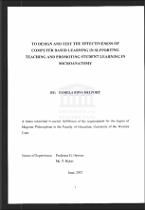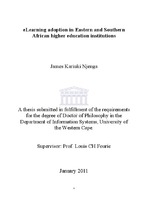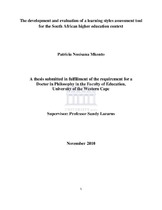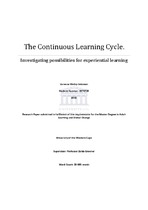To design and test the effectiveness of computer based learning in supporting teaching and promoting student learning in microanatomy
Abstract
The 1990's have brought some critical challenges to medical and dental students. The amount of information necessary to function effectively in the medical profession is expanding. This knowledge explosion results in curriculum crowding, making it more difficult for students to master the curriculum. The problems encountered when studying the course are retention, understanding and application of basic science information. The dentistry students at the University of the Western Cape encountered several problems studying the histology course, viz. the short time allocated to assimilate an immense amount of knowledge, integrating theory (the lectures) with the practicals
(microscopy) and the orientation and identification of sections on microscopic slides. A series of revision programs were designed in histology using a Macromedia Authorware program. Each program has a set of light micrographs with relevant text. Images are labeled to orientate and help students to identify the sections. These programs are incorporated into the curriculum to assist students in the mastery of
important concepts in microanatomy. A test was added to the program, which allowed students to assess if they had mastered the chapter(s) they were revising. Students were given time to use these programs, alone or in groups, for as long as they needed and as often as they wanted to use them. They were also given questionnaires in which they were asked to evaluate the programs as well as the testware. The results showed that they enjoyed using this innovative means of studying. They felt the computer based instructional programs definitely enhanced the course. Multimedia tutorials also created an environment that encouraged peer learning and peer teaching. Being able to assess their knowledge once they had completed the chapter was not as traumatic as a class test. In its initial stages, these programs have shown to be an effective tool for the learning and self-testing of histology. It is clear from the results that students found this an
interesting way to learn histology.
Collections
Related items
Showing items related by title, author, creator and subject.
-
eLearning adoption in Eastern and Southern African higher education institutions
Njenga, James Kariuki (University of the Western Cape, 2011)This research was undertaken to propose a model for eLearning adoption in Higher Education in Africa and to identify and empirically test measures to assess the model. The model identified eLearning, individual and ... -
The development and evaluation of a learning styles assessment tool for the South African higher education context
Mkonto, Patricia Nosisana (University of the Western Cape, 2010)A literature study focusing on teaching and learning in higher education in South Africa was conducted. Theories relevant to adult learning were also examined. These included behaviourist, cognitive, humanistic and social ... -
The continuous learning cycle. Investigating possibilities for experiential learning
Welby-Solomon, Vanessa (University of the Western Cape, 2015)Scholars focusing on experiential learning argue that experience should be considered as critical for adult learning. This research paper frames experiential learning within a Constructivist framework. This paper focuses ...




